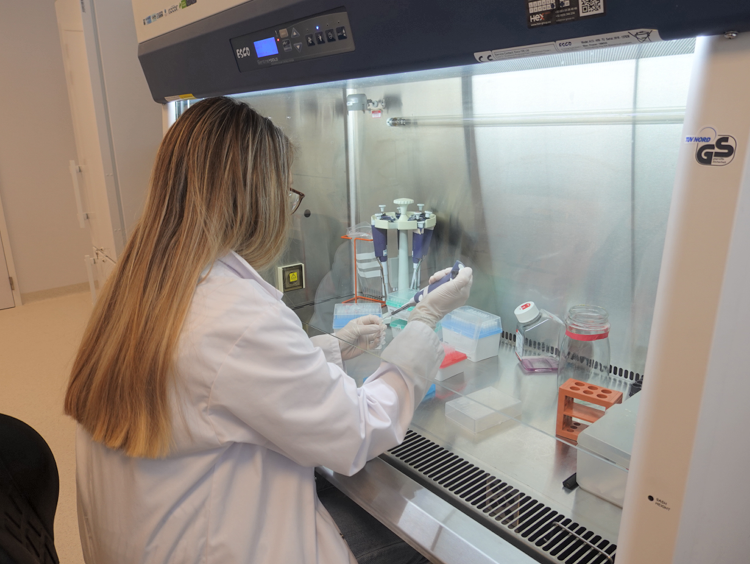Health problems
Burkitt Lymphoma

A Burkitt lymphoma is a malignant tumour of the lymphatic system. It is an aggressive type of B-cell non-Hodgkin lymphoma that can affect both children and adults.
Persons with a weakened immune system (following certain treatment or presenting various infectious diseases such as HIV) are at increased risk of developing a Burkitt lymphoma.
Symptoms of a Burkitt lymphoma include:
- Weight loss, fever, perspiring or extreme fatigue as in the case of other lymphomas
A lump at the site of a lymph node or organ or in the throat.
Abdominal pain and digestive disorders: constipation, nausea, vomiting.
Neurological symptoms: confusion, headaches, vision problems or difficulty walking
There are a number of stages in a Burkitt lymphoma diagnosis:
1. Clinical examination: a doctor may detect swollen lymph nodes or abdominal masses during a physical examination.
2. Biopsy: removal of a lymph node or bone marrow sample for laboratory analysis.
3. Blood tests: to check the number of blood cells and evaluate organ function.
4. Imaging: a PET scan makes it possible to visualise lymph nodes and other affected organs. Magnetic resonance (supplementing a lumbar punction) makes it possible to detect the presence of tumour cells in the brain.
5. Genetic examination: this detects specific anomalies in the lymphocyte cells.
In most cases treatment takes the form of intensive chemotherapy combined with immunotherapy (rituximab; monoclonal antibody that targets B lymphocytes). The treatment is intense and of short duration (generally 3 to 6 months), associated with major acute toxicity (hair loss, fatigue, drop in blood cells, risk of infection) and requires frequent hospitalisation.
Thanks to progress in diagnosis, support care and treatment, recovery rates are above 95% in children and around 80% in adults. It is rare for this lymphoma to return and if it does it is within 12 months of the diagnosis.
Treatment brings a low but increased risk compared to the general population of long-term complications (secondary neoplasia, cardiovascular diseases, infertility) with a need for specific lifelong monitoring.
Support and Resources
Living with a Burkitt lymphoma can be difficult for both the patient and those close to them. Here are some useful resources: :
- On-line support and information groups: Joining a support group can help share experiences and obtain emotional support. Reliable websites such as those of the League Against Cancer or patients’ associations provide information and practical advice.
• https://cancer.be/cancer/lymphome-non-hodgkinien/
• https://alwb.be/
• https://lymphoma-action.org.uk/types-lymphoma-non-hodgkin-lymphoma/burkitt-lymphoma
• https://www.kanker.nl/kankersoorten/lymfeklierkanker - Psycho-oncological consultations: The psycho-oncological services provide specialised psychological support.
https://www.bordet.be/fr/psychooncologie
https://www.psycho-oncologie.be/
A Burkitt lymphoma must be treated at a centre specialised in oncohematology and urgently. The prognosis is generally favourable but as the treatment is intense close cooperation between the care staff, patient and loved ones is essential.
The Jules Bordet Institute is recognised as an expert centre for diagnosis, treatment and research in the field of Burkitt lymphoma by the EuroBloodNet network. Located at a university hospital, it offers advanced treatment with MRI, PET scans, chemotherapy, radiotherapy and immunotherapy. Active in clinical research, the centre participates in innovative trials proposing experimental treatment.
- https://eurobloodnet.eu/members/experts/search/?DiseaseForm[disease]=164#results
- https://www.burkitt-lymphoma.org/
Associated publications:
- https://www.bjh.be/journal-article/bhs-guidelines-for-the-treatment-of-burkitts-lymphoma/
- https://ashpublications.org/blood/article/137/6/743/474125/The-treatment-of-Burkitt-lymphoma-in-adults
Fulvio Massaro (Haematology)
Virginie De Wilde (Haematology)
Marie Vercruyssen (Haematology)
Marie Maerevoet (Haematology)
Alice Wolfromm (Haematology)
Anatomic pathology
Laboratories (morphology, cytofluorometry, cytogenetics)
Outpatient and hospitalisation revalidation
Radiology
Nuclear medicine